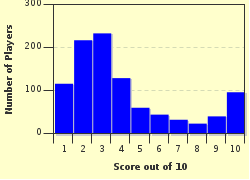Quiz Answer Key and Fun Facts
1. "Little Jack Horner
sat in a corner
eating a Christmas pie;
He put in his thumb
and pulled out a plum
and said 'what a good boy am I?'"
What is the plum that this rhyme refers to?
2. "Ring-a-Ring o' Roses" is about the bubonic plague.
3. A worker in London pawns his coat in order to pay for basic food and then uses up the rest of the money by going on a pub crawl. Which nursery rhyme, some historians suggest, might this be the real meaning behind?
4. "Old Mother Hubbard
went to the cupboard
to fetch her poor dog a bone
But when she got there
the cupboard was bare
and so the poor dog had none"
One interpretation is that Old Mother Hubbard was Cardinal Wolsey and the rhyme refers to the king's "great matter". In this context, who or what is the "cupboard" that was "bare"?
5. "London Bridge is Falling Down
Falling down, falling down
London Bridge is falling down
My fair lady".
Who or what, in the gruesome context of this rhyme, has it been suggested might be the fair lady?
6. What English town lays claim to providing the inspiration for the three nursery rhymes, "Old King Cole", "Humpty Dumpty" and "Twinkle Twinkle Little Star"?
7. "Rub-a-dub-dub, three _____ in a tub". The rhyme today says it is three men in the tub but the first recording of the rhyme has something different, that casts a whole new (and less wholesome) light on the meaning of the rhyme. Who was spied upon in the tub?
8. "The Grand Old Duke of York
He had ten thousand men
He marched them up to the top of the hill
And he marched them down again"
Which of these men has been mentioned as a possible contender to be the Duke of York of the rhyme?
9. "Doctor Foster went to Gloucester
in a shower of rain".
Which tall English king is reputed to be the Doctor Foster of this rhyme?
10. "Pussy Cat, Pussy Cat where have you been?
I've been to London to visit the queen"
If the Queen is Elizabeth I, who is represented in this rhyme by the cat?
Source: Author
Snowman
This quiz was reviewed by FunTrivia editor
MotherGoose before going online.
Any errors found in FunTrivia content are routinely corrected through our feedback system.

